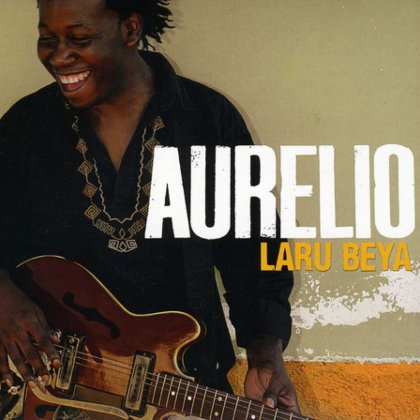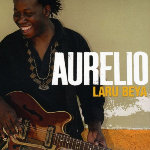- artist:Aurelio
- featured artist:Aurelio Martinez
- region:Central America
- release year:2011
- style(s):Paranda, Garifuna
- country:Honduras
- formats:Audio File / Digital
- record posted by:Stonetree Records
- label:Stonetree Records
- buy this record
Links
Born in the tiny coastal hamlet of Plaplaya on Honduras’ Caribbean coast, Aurelio Martinez may be one of the last generations to grow up steeped in Garifuna tradition. These traditions encompass the African and Caribbean Indian roots of his ancestors, a group of shipwrecked slaves who intermarried with local natives on the island of St. Vincent, only to be deported to the Central American coast in the late eighteenth century.
In 2008, Andy Palacio passed away unexectdely at the young age of 48, leaving the Garifuna community stunned and bereft. Laru Beya was not only a way of honoring Palacio as a person; it was a means for continuing his mission of uplifting and expanding what it meant to be a Garifuna artist. Together with Duran, several veteran Garifuna musicians, and the occasional local ensemble dropping into the studio, Martinez began laying down the tracks for this recording in a cabana on the beach.
Photo by: Sarah Weeden Taking up Palacio’s mantle as bard and advocate for his people, however, did not mean Martinez stopped his exploration of new approaches to Garifuna sounds, in particular their musical links with West Africa. Thanks to a mentorship with Afropop legend Youssou N’Dour (as part of the Rolex Mentor and Protégé Arts Initiative), Martinez found himself in Senegal, learning from the stunning singer, rethinking his arrangements, and meeting everyone from big names in Dakar (Orchestra Baobob, who recorded with Martinez) to unknown talents hanging out in the back alleys of the city’s poor medina.
The result is a lush journey marked with thoughtful reflections of the Garifuna past, the sometimes difficult present, and the promising glimmers of the future for artists like Martinez. “This album is about far more than just keeping tradition alive; it’s about urging people to action when they listen. We’re dealing with an emergency, and we don’t know if Garifuna music will survive,” muses Duran. “But this album will show people in Central America and around the world that Garifuna music is alive and well, and that artists are moving it forward.”
“We’re not going to let this culture die,” Martinez affirms. “I know I must continue the culture of my grandparents, of my ancestors, and find new ways to express it. Few people know about it, but I adore it, and it’s something I must share with the world.”



